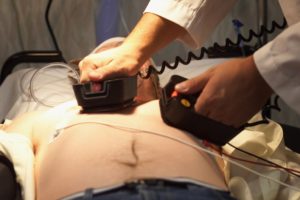 Heart recovery may be improved by resuming regular exercise soon after a heart attack. Simply restoring the blood flow to the oxygen-starved areas of the heart after a heart attack in not enough for the proper heart functioning. The heart changes structurally as the affected areas become thinner and scarred. As a result, heart attack survivors often develop various heart complications. Researchers in Germany and Luxemburg investigated whether aerobic exercise could reduce scarring, thinning, and structural changes, and this way improve recovery.
Heart recovery may be improved by resuming regular exercise soon after a heart attack. Simply restoring the blood flow to the oxygen-starved areas of the heart after a heart attack in not enough for the proper heart functioning. The heart changes structurally as the affected areas become thinner and scarred. As a result, heart attack survivors often develop various heart complications. Researchers in Germany and Luxemburg investigated whether aerobic exercise could reduce scarring, thinning, and structural changes, and this way improve recovery.
The researchers conducted their study on mice that ran on a wheel regularly for six weeks prior to a heart attack induction. Then the mice continued their activity five days after a heart attack and continued exercising for four more weeks.
Advertisement
Compared to sedentary mice, those who exercised regularly had less scarring, thinning, and structural changes in the heart. The researchers wrote, “Our results suggest that the re-initiation of exercise can be recommended to patients relatively early.”
How to recover after a heart attack
Putting together an after-heart-attack diet plan is one of the first steps your doctor will suggest. While it may sound like a tedious task, you might be pleasantly surprised at the number of foods that you can still enjoy.
A diet for heart attack patients really resembles the type of diet we should all be following. As the American Heart Association points out, a variety of nutritious foods from all food groups is good for our overall wellbeing, not just our heart. The Association does contend that heart disease patients have to pay special attention to what they eat.
Adjusting cooking methods can also be helpful. For example, poaching, steaming, and baking are all healthier ways to prepare food.
After a heart attack, you need to avoid foods that have a lot of saturated fats and trans fats, because these fats can build up in the blood and eventually clog or block your blood vessels, thus leading to another attack. Salt can cause blood pressure to rise and increase the risk of a heart attack. Most of you have likely heard that cholesterol is a contributor to heart disease, and this is why heart attack patients have to be careful about their cholesterol levels. Produced by the liver, cholesterol is basically a material that is much like fat. It clogs arteries and can cause them to harden. If you have had a heart attack, you should limit your intake to less than 300 mg of cholesterol per day.
Advertisement
Many people have reported doing well with the Mediterranean diet following a heart attack. The diet includes a lot of fresh fruit and vegetables, nuts, fresh fish, and a very limited amount of meat or dairy.
It’s important to understand that exercise after heart attack is different for each patient. The rehabilitation time varies from one person to another. Often, it depends on what shape a person was in before the heart attack occurred and how much damage the person sustained during the heart episode. Most patients do need some sort of cardiac rehabilitation. Patients who go through cardiac rehabilitation programs tend to have a faster recovery and a better outcome in the long run.
Here are some basic guidelines when it comes to cardiac rehab:
- Begin slowly, gradually increasing your walking pace. If you feel out of breath, then slow down.
- Remember to cool down at the end of your exercise session by walking slower.
- If walking outside, walk with someone.
- Talk to your doctor before lifting weights.
- If you notice any symptoms, such as shortness of breath, pain, or palpitations, stop exercising and contact your doctor right away.
Participating in exercise following a heart attack can cause some people stress, which of course is not good for you. Enrolling in an outpatient rehabilitation program is a good way to develop the best exercise program and give you the confidence that you are going about it the safest way possible. Many cardiac programs also include experts who can guide you on lifestyle changes, including a heart-healthy diet.
